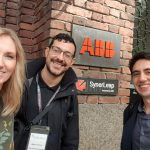CISB and official partner in Brazil-Europe project. The objective is to use the so-called Internet of Things to create intelligent irrigation systems capable of optimizing water use to reduce costs, increase agribusiness productivity and preserve the planet’s natural resources.
 An important landmark in the conscious use of water is being written by Brazilian and European researchers. Using the Internet of Things, an intelligent irrigation system promises to bring greater productivity to producers and to save water resources, a key action given that, today, agriculture is responsible for 70% of the world’s water consumption.
An important landmark in the conscious use of water is being written by Brazilian and European researchers. Using the Internet of Things, an intelligent irrigation system promises to bring greater productivity to producers and to save water resources, a key action given that, today, agriculture is responsible for 70% of the world’s water consumption.
Named SWAMP (Smart Water Management Platform), the project aims to spread low-cost sensors that detect the real need for irrigation in the cultivated areas. The technology is cutting edge and even uses drones to take measurements. “In both Brazil and abroad, it is common for irrigation to be done without scientific parameters. This implies using more water than necessary”, explains André Torre Neto, from Embrapa (Brazilian Agricultural Research Corporation), one of the partners in the project. The practice, besides causing waste, generates the so-called leaching process, in which excess water takes away part of the plants’ nutrients, leading those nutrients to the soil, together with any pesticides. “Using water resources correctly is decisive for better productivity”, he says.
In addition to Embrapa, there are 11 other Brazilian and European institutions, including the Universidade Federal do ABS (UFABC – Federal University of ABC), Universidade Federal de Pernambuco (UFPE- Federal University of Pernambuco), University of Bologna, in Italy, Intercrop, of Spain, and VTT Technical Research Center, of Finland. CISB, in turn, will be responsible for the project’s dissemination platform, both in Brazil and internationally.
According to SWAMP’s Brazilian leader, professor Carlos Alberto Kamienski of UFABC, a significant amount of data collected by the sensors should be stored in the cloud for further processing and analysis. With this, the project will address different technologies, such as cloud computing, high-performance processing, 5G, and Internet of Things.
Kamienski explains that four pilots will be put into action for a period of three years, starting December 2017: two in Brazil and two in Europe. The Brazilian applications will be strategically set in a winery in the state of São Paulo, and in soybean plantations in the region called Matopiba, which includes the states of Maranhão, Tocantins, Piauí and Bahia. “Thus, several types of crops that use distinct types of irrigation will be analyzed”, he says.
Much of the technical work is being conducted by the VTT. For Juha-Pekka Soininen, the company’s chief scientist, one of the great challenges ahead will be to create solutions that go beyond pilots. “Replication, replication, impact measurement in agriculture, transferability to other uses are the key issues”, he points out.
The proposal presented by this international consortium competed with another 50 submitted, involving over 300 institutions within the scope of the 4th Brazil coordinated call on Europe Information and Communication Technology. In total, SWAMP will be contemplated with 1.5 million euros in resources.




